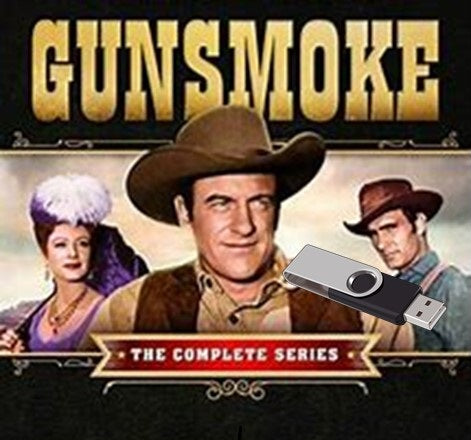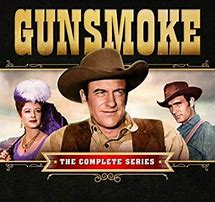MadeAgainGills Online Media
GUNSMOKE TV SERIES - COMPLETE COLLECTION 1955 to 1975 (Complete TV Series ) ON USB
GUNSMOKE TV SERIES - COMPLETE COLLECTION 1955 to 1975 (Complete TV Series ) ON USB
5.0 / 5.0
(1) 1 total reviews
Couldn't load pickup availability
GUNSMOKE TV SERIES - COMPLETE COLLECTION 1968-2003 SEASONS 1-20 ON USB ONLY 246GB
Gunsmoke is an American radio and television Western drama series created by director Norman Macdonnell and writer John Meston. It centered on Dodge City, Kansas, in the 1870s, during the settlement of the American West. The central character is lawman Marshal Matt Dillon, played by William Conrad on radio and James Arness on television.
The radio series ran from 1952 to 1961. John Dunning wrote that, among radio drama enthusiasts, "Gunsmoke is routinely placed among the best shows of any kind and any time. It ran unsponsored for its first few years, with CBS funding its production.
In 1955, the series was adapted for television and ran for 20 seasons. It ran for half-hour episodes from 1955 to 1961, and one-hour episodes from 1961 to 1975. A total of 635 episodes were aired over its 20 year run. At the end of its run in 1975, Los Angeles Times columnist Cecil Smith wrote: "Gunsmoke was the dramatization of the American epic legend of the west. Our own Iliad and Odyssey, created from standard elements of the dime novel and the pulp Western as romanticized by Buntline, Harte, and Twain. It was ever the stuff of legend."
Five made-for-TV movies were produced after its 20-year run. The show won 15 Primetime Emmy Awards as well as other accolades. It was frequently well received, holding a top-10 spot in the Nielsen ratings for several seasons.
The United Kingdom series was initially titled Gun Law.
Radio series (1952–1961)
Gunsmoke
Original release April 26, 1952 –
June 18, 1961
No. of series 9
No. of episodes 480 (List of episodes)
Audio format Monaural
In the late 1940s, CBS chairman William S. Paley, a fan of the Philip Marlowe radio series, asked his programming chief, Hubell Robinson, to develop a hardcore Western series, about a "Philip Marlowe of the Old West". Robinson delegated this to his West Coast CBS vice president, Harry Ackerman, who had developed the Philip Marlowe series.
Ackerman and his scriptwriters, Mort Fine and David Friedkin, created an audition script called "Mark Dillon Goes to Gouge Eye" based on one of their Michael Shayne radio scripts, "The Case of the Crooked Wheel", from mid-1948. Two versions were recorded. The first, recorded in June 1949, was very much like a hardcore detective series and starred Michael Rye (credited as Rye Billsbury) as Dillon; the second, recorded in July 1949, starred Straight Arrow actor Howard Culver in a more Western, lighter version of the same script. CBS liked the Culver version better, and Ackerman was told to proceed.
A complication arose when Culver's contract as the star of Straight Arrow would not allow him to do another Western series. The project was suspended for three years, when producer Norman Macdonnell and writer John Meston discovered it while creating an adult Western series of their own.
Macdonnell and Meston wanted to create a radio Western for adults, in contrast to the prevailing juvenile fare such as The Lone Ranger and The Cisco Kid. Gunsmoke was set in Dodge City, Kansas, during the thriving cattle days of the 1870s. Dunning notes, "The show drew critical acclaim for unprecedented realism."
Episodes
Main article: List of Gunsmoke (radio series) episodes
Cast
The radio series first aired on CBS on April 26, 1952, with the episode "Billy the Kid", written by Walter Newman, and ended on June 18, 1961. The show stars William Conrad as Marshal Matt Dillon, Howard McNear as Doc Charles Adams, Georgia Ellis as Kitty Russell, and Parley Baer as Dillon's assistant, Chester Wesley Proudfoot.
Matt Dillon
William Conrad in 1952, when Matt Dillon was created on radio
Matt Dillon was played on radio by William Conrad and on television by James Arness. Two versions of the same pilot episode titled "Mark Dillon Goes to Gouge Eye" were produced with Rye Billsbury and Howard Culver playing Marshal Mark Dillon as the lead, not yet played by Conrad. Conrad was one of the last actors to audition for the role of Marshal Dillon. With a resonantly powerful and distinctive voice, Conrad was already one of radio's busiest actors. Though Meston championed him, Macdonnell thought Conrad might be overexposed. During his audition, however, Conrad won over Macdonnell after reading only a few lines. Dillon, as portrayed by Conrad, was a lonely, isolated man, toughened by a hard life. Macdonnell later claimed, "Much of Matt Dillon's character grew out of Bill Conrad."
Meston relished the upending of cherished Western fiction clichés and said that few Westerns gave any inkling of how brutal the Old West was in reality. Many episodes were based on man's cruelty to man and woman, inasmuch as the prairie woman's life and the painful treatment of women as chattels were touched on well ahead of the time of most media. As originally pitched to CBS executives, this was to be an adult Western, not a grown-up Hopalong Cassidy.
Dunning writes that Meston was especially disgusted by the archetypal Western hero and set out "to destroy [that type of] character he loathed". In Meston's view, "Dillon was almost as scarred as the homicidal psychopaths who drifted into Dodge from all directions."
Doc Adams
Howard McNear starred as Dr. Charles Adams in the radio series, and Milburn Stone portrayed Dr. Galen Adams in the television version. In the radio series, "Doc" Adams was initially a self-interested and somewhat dark character with a predilection for constantly attempting to increase his revenue through the procurement of autopsy fees. He was acerbic, somewhat mercenary, and borderline alcoholic, in the program's early years. His real name was Dr. Calvin Moore. He came west and changed his name to escape a charge of murder. However, McNear's performances steadily became more warm-hearted and sympathetic. Doc wandered throughout the territories until he settled in Dodge City 17 years later under the name of Charles Adams. Conrad borrowed the surname from cartoonist Charles Addams as a testament to Doc's initially ghoulish comportment. Milburn Stone was given free rein to choose the character's first name, and chose that of the ancient Greek physician and medical researcher Galen.
Miss Kitty
Kitty was played by actress Georgia Ellis on radio, and by Amanda Blake on television. Ellis first appeared in the radio episode "Billy the Kid" (April 26, 1952) as "Francie Richards" – a former girlfriend of Matt Dillon's and the widow of a criminal, but the character of "Miss Kitty" did not appear until the May 10, 1952, episode "Jaliscoe". Sometime in 1959, Ellis was billed as Georgia Hawkins instead of Georgia Ellis. Amanda Blake appeared in over 500 episodes of the television series, with her last being the April 1, 1974, episode titled, "The Disciple".
In the radio series, Kitty's profession was hinted at, but never explicit; in a 1953 interview with Time, Macdonnell declared, "Kitty is just someone Matt has to visit every once in a while".[1] The magazine observed that she is "obviously not selling chocolate bars".[11] The television show first portrayed Kitty as a saloon dance hall employee, then from season two, episode 36 ("Daddy-O"), as half-owner of the Long Branch Saloon.
Dillon and Kitty clearly have a close personal relationship.
Distinction from other radio Westerns
The interior of the real Long Branch Saloon in Dodge City, Kansas, photographed between 1870 and 1885
Gunsmoke is often a somber program, particularly in its early years. Dunning writes that Dillon "played his hand and often lost. He arrived too late to prevent a lynching. He amputated a dying man's leg and lost the patient anyway. He saved a girl from brutal rapists, then found himself unable to offer her what she needed to stop her from moving into ... life as a prostitute." Some listeners, such as Dunning, argue the radio version was more realistic. Episodes were aimed at adults with some of the most explicit content of their time, including violent crimes, scalpings, massacres, and opium addicts. Many episodes end on a somber note, and villains often get away with their crimes.
The program was set after the arrival of the railroad in Dodge City (1872), and Kansas had been a state since 1861. In reality, a U.S. Marshal (actually a deputy marshal, because only the senior officer in the district holds the title "marshal") would not be based in Dodge City and would not be involved in local law enforcement.
Apart from the doleful tone, Gunsmoke is distinct from other radio Westerns, as the dialogue is often slow and halting, and the outstanding sound effects give a palpable sense of the prairie setting. The effects are subtle but multilayered, giving the show a spacious feel. John Dunning wrote, "The listener heard extraneous dialogue in the background, just above the muted shouts of kids playing in an alley. He heard noises from the next block, too, where the inevitable dog was barking."
Gunsmoke is unique from other Westerns in that it was unsponsored in the first few years of production. The program was funded by CBS in the first two years. Series producers said that if the show were sponsored, they would have to "clean the show up". The producers wanted to find a sponsor that would allow them to keep the show the way it was.
Television proposal
Not long after the radio show began, talk began of adapting it to television. Privately, Macdonnell had a guarded interest in taking the show to television, but publicly, he declared, "our show is perfect for radio", and he feared, as Dunning writes, "Gunsmoke confined by a picture could not possibly be as authentic or attentive to detail. ... In the end, CBS simply took it away from Macdonnell and began preparing for the television version."
Conrad and the others were given auditions, but they were little more than token efforts – especially in Conrad's case, due to his obesity. However, Meston was kept as the main writer. In the early years, most of the television episodes were adapted from the radio scripts, often using identical scenes and dialogue. Dunning wrote, "That radio fans considered the TV show a sham and its players impostors should surprise no one. That the TV show was not a sham is due in no small part to the continued strength of Meston's scripts."
Macdonnell and Meston continued the radio version of Gunsmoke until 1961, making it one of the most enduring vintage radio dramas.
Conrad directed two television episodes, in 1963 and 1971, and McNear appeared on six, playing characters other than Doc, including three times as storekeeper Howard Rudd.
The television series ran from September 10, 1955, to March 31, 1975, on CBS, with 635 total episodes. It is the second Western television series written for adults, premiering on September 10, 1955, four days after The Life and Legend of Wyatt Earp. The first 12 seasons aired Saturdays at 10 pm, seasons 13 through 16 aired Mondays at 7:30 pm, and the last four seasons aired Mondays at 8 pm. During its second season in 1956, the program joined the list of the top-10 television programs broadcast in the United States. It quickly moved to number one and stayed there until 1961. It remained among the top-20 programs until 1964.
Share




